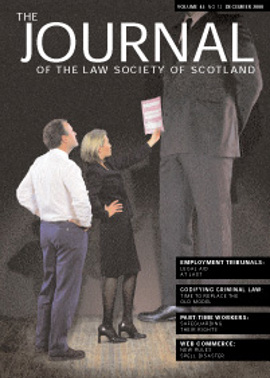Protecting rights of the raided
The Court of Session has introduced important new rules to regulate how orders under s.1 of the Administration of Justice (Scotland) Act 1972 may be used, and clarifies the grounds upon which entry can be refused.
Orders under s.1 of the Administration of Justice (Scotland) Act 1972 (or ‘Dawn Raids’ as they were once known) are an important device in any Court proceedings. Designed to preserve evidence at the outset of an action, the order allows a party to seize evidence that may be important to the case.
However, the rules for carrying out a raid have been unclear and are based more on custom and practice than on any written regulation. For example, only relatively recently has the practice arisen of preventing the party who was seeking to preserve the evidence from joining the raid on the other side.
October 2000 saw the introduction of new rules regulating the execution of such raids.1 While some of the rules are procedural, there are a number of new and important rules for the protection of those being “raided”.
Procedural steps required
- A request for an order under section 1 of the Administration of Justice (Scotland) Act 1972 must be presented by Petition. The Petitioner must now include in the Petition:2
- A list of documents or other items that the Petitioner wishes to recover;
- The address where the Petitioner believes the items can be found; and
- The reasons why the Petitioner believes the Petition is necessary. In other words the Petition has to set out grounds to show that the items may be destroyed, or in some way lost if the order is not granted.
Undertakings to be given
The new rules have also introduced the requirement for an undertaking to be given by the Petitioner.3 While the undertaking can be amended by the Court if it is satisfied that there are grounds to do so, the starting point will be:
- An undertaking that the Petitioner will comply with any court order as to the payment of compensation if it is subsequently shown that the order, or implementation of the order has caused loss to the holder of the document;
- An undertaking that the Petitioner will bring subsequent proceedings within a reasonable period of time; and
- An undertaking that the Petitioner will not use the information obtained except for the purposes of the proceedings which the Petitioner intends to bring.
Notice to the other side
Previously a caveat could be used to obtain prior notice of an interim order, but not for an order under s.1 of the Administration of Justice (Scotland) Act 1972. However, the new rules state that the Court may order intimation as it sees fit.4 It is likely that an order for intimation will depend on the importance of surprise in securing the evidence.
Execution of the order
If the order is granted a Commissioner is appointed. The Commissioner tends to be a Senior Counsel nominated by the Petitioner. He or she will visit the premises and explain the effect of the order to those at the premises and prepare an inventory of all the items that are recovered.
One of the interesting reforms is that the order may be served only between 9am and 5pm, Monday to Friday, except “on cause shown”.5 So, if the Petitioner wants to carry out a surprise raid outside office hours, the authority of the Court will be required. Petitioners will need to be prepared to explain why this extra element of surprise is needed.
In what appears to be an attempt to protect “unaccompanied females” the new provisions provide that the Commissioner may not enter premises if the premises are occupied by an unaccompanied female, and if the Commissioner does not have a female with him. This rule would not apply if the Commissioner was female.6 If the circumstances are so extreme that the Commissioner suspects that there may be violent conduct, then he or she should notify the police.
Delaying the order
Previously there was little that a person could do if a Commissioner appeared on his or her doorstep. Now, if a Commissioner appears, the occupier of the premises can delay the search by indicating that he wishes to seek legal advice. If the purpose of seeking legal advice is to help the occupier to decide whether to ask the Court to vary the order the Commissioner cannot commence the search.7
Therefore if a Commissioner appears, the occupier of the building should immediately state that they wish to seek legal advice to consider whether or not the order should be varied.
Return of documents and other items
If no further action is taken by the Petitioner within eight weeks of the items recovered being sent to the Court, then the Court will return the items to the owner.8 Usually proceedings are raised at the same time as the Petition for a section 1 order, but it is important to bear in mind this new time limit.
Conclusion
These new regulations governing recovery of evidence make important changes to the way in which this important procedure is carried out. Careful preparation of the Petition will ensure that the search is most effective. However, simple steps can be taken to ensure that an unwelcome search is prevented.
John MacKenzie is a Solicitor Advocate with Masons, and specialises in contentious IT and intellectual property matters. He can be contacted at john.mackenzie@masons.com
In this issue
- President's report
- Obituary: Frederick James Lilley Main
- A Criminal Code for Scotland
- Protecting the rights of part-time workers
- Protecting rights of the raided
- Fixed penalties "productive of injustice"
- Legal aid for employment tribunals - at last
- Learning lessons that lessen risk
- More Brussels, anyone?
- Justice and home affairs






